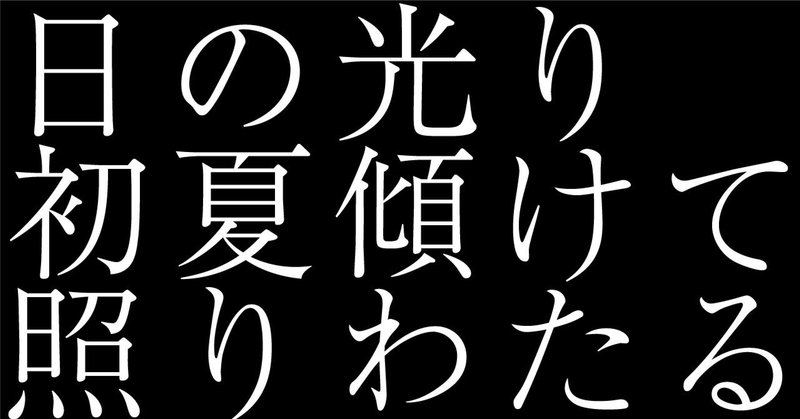
#316 AIが俳句を解釈したらこうなった。 「日の光り初夏傾けて照りわたる」横光利一
日の光り初夏傾けて照りわたる
横光利一
"Sunlight pours down, tilting into early summer, filling all with light."
Yokomitsu Riichi

解説:
この俳句「日の光り初夏傾けて照りわたる」は、横光利一によって作られました。この一句は、初夏の訪れとその中で感じられる日の光の強さを表現しています。自然の変化を捉えつつ、それに伴う感情や気持ちの移り変わりを巧みに描いています。
風物詩
この俳句は、初夏の季節を象徴する情景を捉えています。初夏は、春から夏へと移り変わる過程で、日の光がより強くなり、気温が上がり始める時期です。この季節は新緑が生い茂り、自然が活発な生命力を示す時でもあります。「日の光り」という表現は、この季節特有の明るく、力強い日差しを感じさせ、初夏の日の長さと強さを強調しています。
表現手法
「初夏傾けて」というフレーズは、季節の進行を表現するために用いられています。これは、時間の流れの中で初夏がゆっくりと傾き始め、その影響が周囲の自然や環境に及ぼす様子を描いています。また、「照りわたる」という言葉は、日の光が広範囲にわたって強く照り輝いている様子を表し、視覚的にも感じることのできる光景を創出しています。この表現は、光が全てを照らす力強さと、その中に含まれる温かみや活力を象徴しています。
情緒や感情
この俳句は、初夏の光り輝く景色を通じて、読者に明るさと希望を感じさせることができます。季節の変化を感じることは、新たな始まりや変化への期待を意味し、それは多くの人々にとって前向きな感情を喚起します。また、自然の中で日光が強くなることは、活動的でエネルギッシュな気持ちを引き出すこともあり、この俳句はそうした情緒を巧みに表現しています。
全体として、この俳句は初夏の日の光りとその中で感じられる生命力を美しく捉えており、季節の変わり目の感情や感覚を詩的に映し出しています。自然の中での日々の変化を積極的に捉え、それを楽しむ姿勢が詠み込まれています。
英訳:
Explanation
This haiku by Yokomitsu Riichi captures the essence of early summer, a time when the sunlight grows stronger and the days longer. The poem reflects the natural progression of the seasons and celebrates the invigorating quality of the sun as it begins to dominate the landscape.
Seasonal Imagery
The phrase "Sunlight pours down" evokes a vivid image of the sun’s rays intensifying as spring transitions into summer. This imagery is typical of early summer when nature is bathed in light, enhancing growth and vitality. The use of "tilting into early summer" metaphorically suggests the gradual change of seasons, where the angle of the sun shifts, bringing with it a warmer climate and brighter days.
Artistic Expression
Yokomitsu utilizes a dynamic description of sunlight to emphasize the power and beauty of nature's cycles. The word "tilting" serves as a poetic expression of both the physical change in the sun's path and the perceptual shift in how we experience the lengthening days. "Filling all with light" beautifully concludes the haiku, encapsulating the overwhelming influence of sunlight that permeates every corner of the landscape, signifying abundance and renewal.
Emotional and Sentimental Tone
The haiku conveys a sense of awe and appreciation for the natural world, particularly the life-giving force of the sun. There is an underlying optimism in the depiction of sunlight enriching the environment, which resonates with feelings of rejuvenation and hope that often accompany the arrival of summer. This positive outlook invites readers to reflect on the seasonal transformation and to find joy in the simple beauty of sunlight enveloping the natural world.
Overall, Yokomitsu Riichi’s haiku is a poetic celebration of early summer, capturing the transformative power of sunlight. It highlights the beauty of seasonal change and encourages an emotional connection with the natural progression of time and nature’s rhythms. The haiku not only paints a picturesque scene but also evokes a deep emotional response to the enduring cycle of growth and renewal inherent in the natural world.
横光利一

横光利一(1898年 - 1947年)は、日本の小説家、評論家、そして俳人であり、特にモダニストとして知られています。彼は新感覚派の代表的な作家として、1920年代の日本文学に大きな影響を与えました。彼の作品は感覚や科学的客観性に重点を置いたもので、新感覚派の一翼として活動しました。
横光は福島県会津若松市で生まれ、早稲田大学で学びました。彼の文学キャリアは、雑誌「文芸春秋」での活動から始まり、後に「文芸時代」を川端康成と共に創刊しました。彼の初期の著名な作品には『日輪』や『蠅』があり、これらの作品で彼は文壇に登場し、注目を集めました。
横光の作品は、西洋の文学と深く関わりながらも独自のスタイルを確立しました。彼の影響を受けた作家には、ドストエフスキーやフローベール、プルーストなどが含まれます。また、彼自身も多くの日本の後進の作家に影響を与え、梅崎春生や坂口安吾、三島由紀夫などがその中にいます。
戦後は戦時中の行動に批判もありましたが、死後の再評価により、その文学的業績は高く評価されています。横光利一文学会では彼の作品や思想に関する研究が活発に行われており、彼の全集や月報も集成されています。
五月十三日
(英訳:ChatGPT 解説:Bing / ChatGPT 画像生成:midjourney)
この記事が気に入ったらサポートをしてみませんか?
